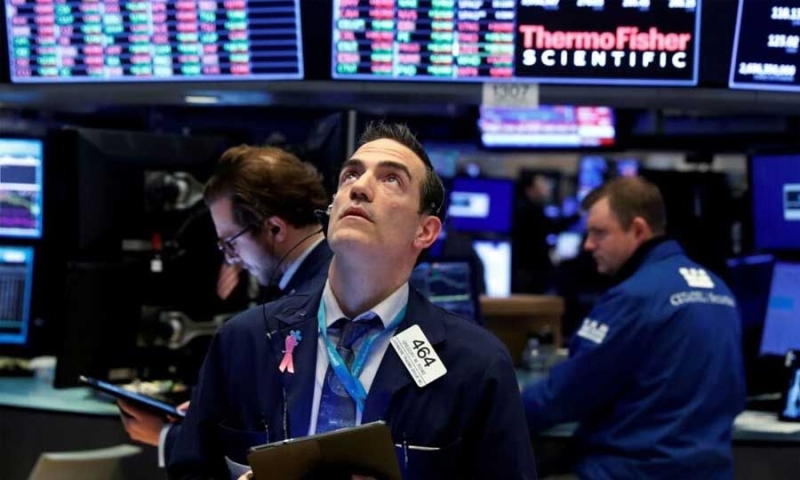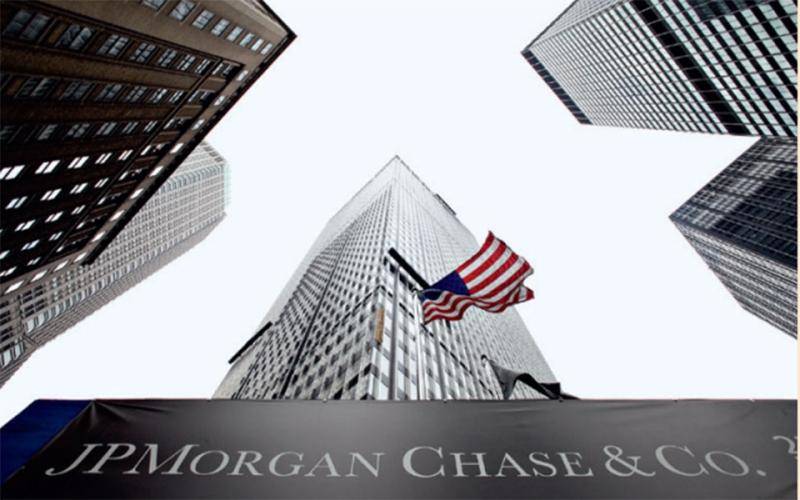IMF revises down growth forecasts in shadow of recent banking turmoil

Fears about the economic outlook in international markets have grown following the collapse of Silicon Valley Bank and Signature Bank and the troubles at Credit Suisse. Photo REUTERS
Eleftheria Kourtalis
By early 2023, economists and business leaders had expressed optimism that the growth of the global economy may not ultimately slow down as much as predicted, with recession slowly slipping out of the equation thanks to positive developments such as the “opening up” of China's economy, the drop in energy prices and the resilience of the European economy.
However, the banking crisis that erupted in March has changed the picture, with the International Monetary Fund downgrading its estimates for global growth last week, underlining that “the economy is entering a dangerous phase of low economic growth and high financial risk”.
Slowdown
The IMF expects global growth to slow from 3.4% in 2022 to 2.8% in 2023, while the estimate of January was for growth of 2.9% this year. “Uncertainty is high and the balance of risks is rising as the financial sector remains volatile,” the Fund said in its latest report.
Fears about the economic outlook have grown following the collapse of Silicon Valley Bank and Signature Bank, two regional US banks, and a loss of confidence in the much larger Credit Suisse in Europe, which was effectively sold to rival UBS in bailout deal backed by the Swiss government.
Already, the global economy was dealing with the effects of high and persistent inflation, rapidly rising interest rates to combat it, rising debt levels and Russia's war in Ukraine.
Now, health concerns of the banking industry have been added to the list. “These forces now interact with new concerns about financial stability,” the IMF said, noting that policymakers trying to tame inflation while preventing a “hard landing” or a painful recession “may face difficult trade-offs.”
The events of March are a vivid example of how the sharpest rise in interest rates since the 1980s can have unintended consequences. “Under the surface there is turmoil and the situation is quite fragile, as the recent period of banking instability has reminded us,” warned the IMF's chief economist, Pierre-Olivier Guerrenza. Initially, the tightening of monetary policy had been good news for banks, mainly because of the boost to net interest income. However, the tremors in the industry in March also showed the other side of this coin. The tightening of credit conditions already evident in both the US and Europe, as well as recent developments, are making banks more cautious about who they lend to, how much they lend and at what interest rate. This will hamper credit flows and hit bank sizes and the economy.
Lending reduction
“Financial conditions have tightened, which is likely to imply lower lending and lower activity if they persist,” the IMF said. If a shock to the global financial system leads to a “sharp” deterioration in financial conditions, global growth could slow to 1% this year, the IMF has warned. That would mean “nearly stagnant per capita income,” the Fund noted.
In fact, the minutes of the Fed's last meeting revealed that its economists predict that the reduction in lending due to the banking turmoil will cause a mild recession later in 2023.
According to analysts, the biggest issue for banks is around deposits, both for the first quarter and for March in particular. Deposits at JP Morgan Chase, Wells Fargo and Bank of America fell by an estimated $521 billion in the first quarter from a year earlier, the biggest drop in a decade.
The environment it's not just bleak for banks, however. In the remainder of 2023, the environment for many companies will become more challenging, with slowing economic growth weighing on revenues, while the reduced ability of businesses to pass on higher costs to consumers will squeeze margins.
As Allianz estimated, the slowdown in growth, the tightening of monetary policy and the tightening of credit conditions will lead to an increase in bankruptcies, by 21% globally, 49% in the US and 23% in the Eurozone, compared to 2022.
Looking for what will “pop”
The turmoil in the banking sector reminded and underlined the consequences of monetary tightening, as noted by Citigroup. After the banking shocks, investors will be wondering what might 'pop' next – and Citi thus believes attention will begin to shift away from the risks of higher interest rates and towards the risks of lower GDP and deteriorating fundamentals . The ongoing crisis of confidence will limit banks' risk appetite and reduce the flow of credit. “Even before the recent turmoil, lending conditions were already tightening. They will probably “tighten” further in the future,” the American bank emphasizes.
2023 is not 2008, but it has significant “thorns”
However, the IMF made it clear that while the rapid rise in interest rates has put pressure on banks and other companies, there are fundamental differences from the global financial crisis of 2008. they now have much more capital to be able to withstand shocks. They have also curbed risky lending due to tighter regulatory regulations.
The views of the investment houses are similar. As JP Morgan notes, for example, certainly the banking system is, and always has been, built on trust. When trust is challenged, it can lead to a sense of panic that feeds on itself and becomes difficult to contain. It also makes it very difficult to predict this situation with any accuracy. While there is huge uncertainty as the banking sector drives credit creation and subsequent economic growth, recent developments with banks are negative for the economic outlook.

Policymakers have tools to solve banking crises, and big banks are much stronger, says JP Morgan.
However, as JP Morgan points out, we are not living through a repeat of 2008, for three main reasons: 1) Policymakers have the tools to resolve banking crises and the biggest banks are much stronger, 2) the economy is in a very different place and 3) the size of the problem is, so far, much smaller – Silicon Valley Bank ($209 billion) and Signature Bank ($110 billion) together had about half the assets of Lehman Brothers ( $640 billion), while Bear Stearns ($400 billion) was also larger than both.
But the IMF pointed to similarities between the latest banking turmoil and the US savings and loan crisis of the 1980s, when problems at smaller banks dented confidence in the wider financial system. The lesson of this March is that problems at smaller institutions can shake broader financial market confidence, particularly as persistently high inflation continues to wreak havoc on bank assets.
So far, investors are pricing in a fairly optimistic scenario for the economy despite recent banking shocks, the IMF noted. However, those expectations could quickly be overturned. If inflation rises further, for example, investors could judge that interest rates will remain higher for longer. “The pressures could then re-emerge in the financial system. Trust – the bedrock of finance – could continue to erode. And funding could quickly disappear for both banks and businesses,” the Fund warned.
The Warning
“Risks for banks have intensified as interest rates have risen rapidly to contain inflation. Historically, such dynamic rate hikes by central banks are often followed by pressures that increase errors in the financial system,” warned IMF chief economist Pierre-Olivier Guerrenza.
$521 billion in deposits fell in largest US banks – JPMorgan, Wells Fargo, Bank of America – in the first quarter.
Interest rates
“Rising interest rates to deal with inflation is the biggest problem for the financial system and the economy. We don't know if any other bank is vulnerable to this. Credit Suisse was already very weak, but there are other European banks that are very fragile,” notes John Danielson, director of the Systemic Risk Center at the London School of Economics.
1 % global growth could slow if a shock to the global financial system leads to a “sharp” deterioration, the IMF has warned.
Lending
“There are signs that bank lending in the Eurozone is declining as a result of continued interest rate hikes. We must remember that monetary policy decisions take about a year and a half to be felt in the real economy, so the full impact has not been seen yet,” stressed Konstantinos Herodotou, governor of the central bank of Cyprus.




